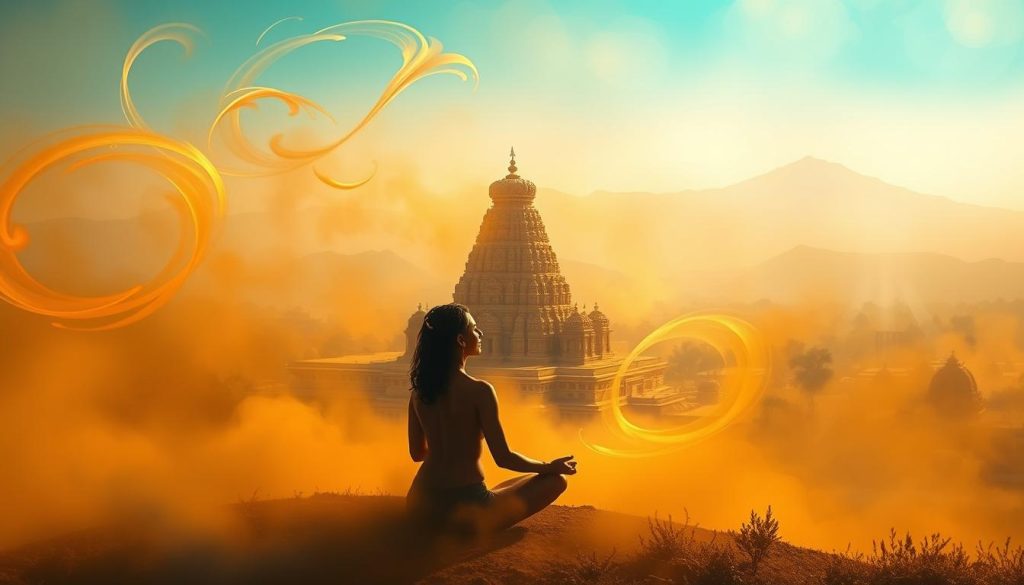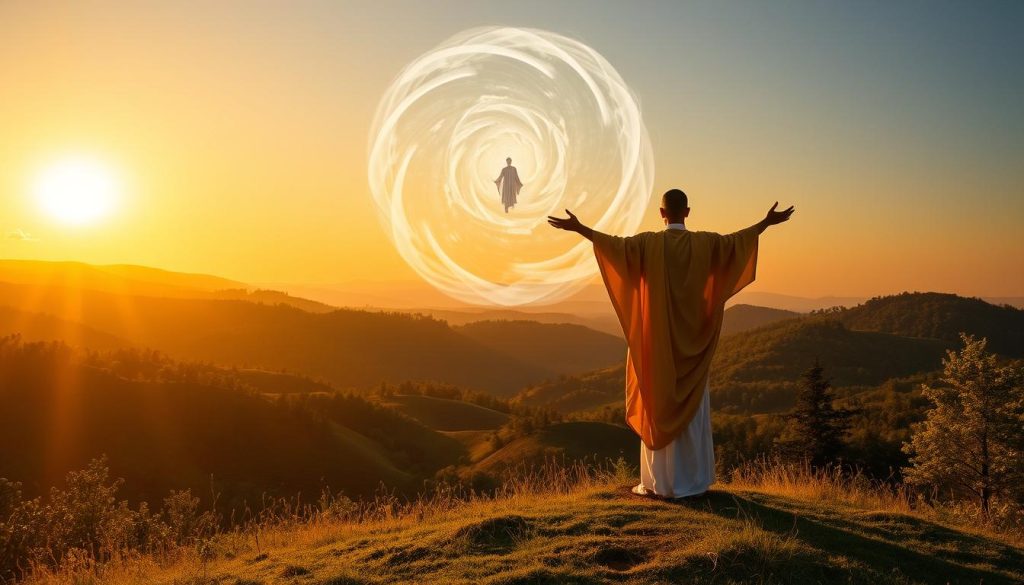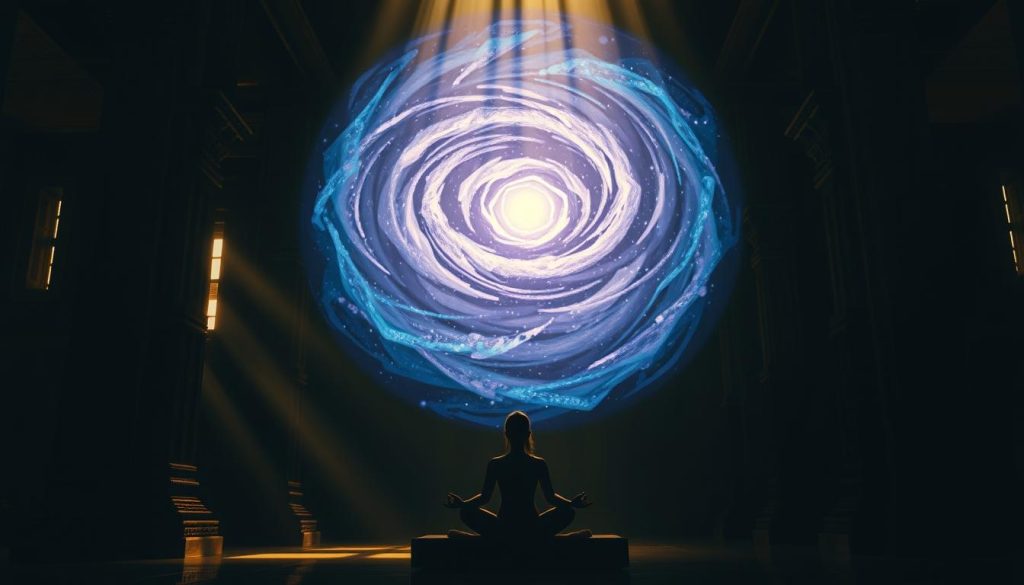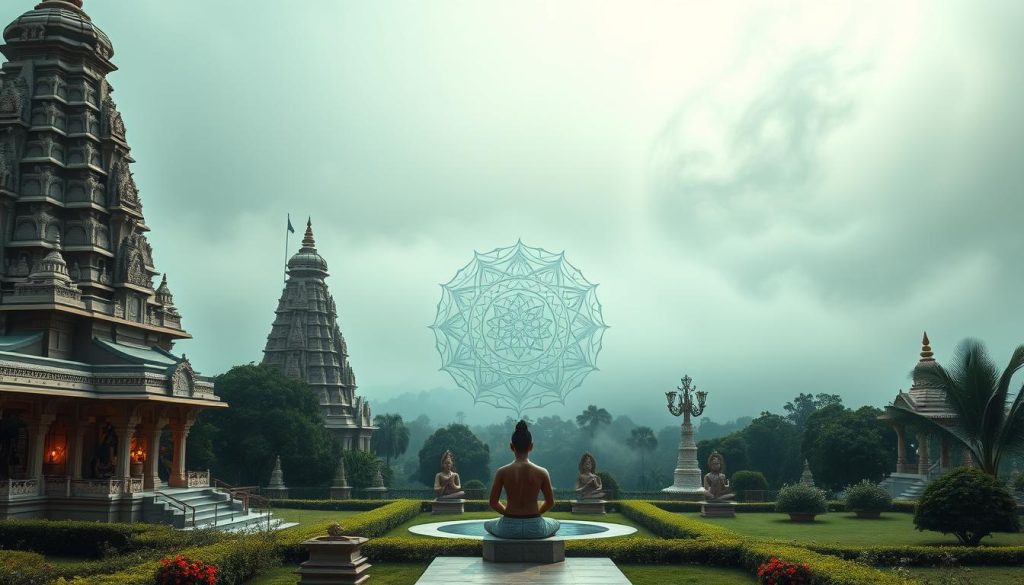Exploring Hindu Reincarnation Beliefs & Concepts
May 27, 2025
Have you ever thought about life and death? Wondered if there's more than just one life? Many people find comfort in Hinduism, especially the idea of reincarnation. As a child, the peaceful chants at our family altars made me feel part of something bigger. It seemed like everything we do is part of a big cycle that goes beyond our normal lives.
Hinduism is also known as Sanatana Dharma, meaning 'eternal way'. It shares deep truths that many people relate to. Movies like "Groundhog Day", "The Matrix", and "Star Wars" also show these ideas. They help make the cycle of life, death, and rebirth more familiar to us. This way, more people understand that life is not just a simple line from being born to dying.
Key Takeaways
- Hindu reincarnation plays a crucial role in Hinduism beliefs, embodying the notion of continuity beyond a single lifetime.
- Sanatana Dharma, translating to 'eternal way', exemplifies the universal truths embraced by humanity.
- Popular culture often mirrors Hindu principles of samsara and karma, making these concepts accessible to a wider audience.
- The cyclical process of life, death, and rebirth found in Hinduism beliefs engages anyone reflecting on life's deeper meanings.
- Embracing these beliefs can provide comfort and a sense of purpose, illuminating the interconnectedness of all actions and existence.
Understanding the Concept of Reincarnation in Hinduism
Reincarnation in Hinduism is very important. It teaches that the soul goes through many lives and deaths. This journey affects both a person's spirit and their everyday life.
Definition of Reincarnation
In Hindu beliefs, reincarnation means the soul enters a new body after death. Karma, the law of actions, decides the soul's fate. So, how one lives influences their next life greatly.
Historical Context
Reincarnation has ancient roots in Hinduism. It began with the Vedic texts and grew over time. Works like the Upanishads and Bhagavad Gita helped shape this idea, teaching about life and death.
Key Texts on Reincarnation
The Bhagavad Gita and Upanishads talk a lot about reincarnation. They tell us that the soul is eternal. Living a good life can lead to a better rebirth and eventually freedom from rebirth, or moksha.

Holy texts guide Hindu death rituals too. Cremation and a period of mourning are part of this. These traditions show the belief in reincarnation around the world, including the UK. For more advice, visit the Hindu Forum of Britain.
The Cycle of Samsara: Life, Death, and Rebirth
The cycle of Samsara shows life, death, and rebirth. It's key in Hinduism. It describes our soul's journey across lifetimes. Our past actions and karma shape our now and future lives.

What is Samsara?
Samsara means being reborn over and over in different forms. It's driven by our karma. It stops when the soul gets free. Samsara shows us that life goes in circles, not straight lines. Every deed impacts our next life. Knowing this helps us get Hindu teachings and why living well matters.
The Journey of the Soul
In Hinduism, the soul, or Atman, moves through Samsara. It goes from one body to the next. Each life is a chance for the soul to improve. The soul's path and rebirth depend on past karma. This shapes each new life's quality. So, living well and growing spiritually is important.
Liberation from Samsara (Moksha)
Hinduism's highest aim is Moksha, or freedom from Samsara. Moksha ends the cycle of life and death. To get free, one must understand their true self. We do this through spiritual practices, living well, and knowing ourselves. This understanding joins us with the divine, ending the cycle forever.
The Laws of Karma and Their Role in Reincarnation
Karma and rebirth are key in Hindu beliefs. Our actions, good and bad, affect not just today but also our next lives. By understanding these, we see karma's big role in our spiritual path.
Definition of Karma
Karma comes from "karman," a Sanskrit term. It shows that each action leads to results, shaping our fate in samsara's cycle. Simply put, good deeds bring good karma, and bad ones bring bad karma.
Types of Karma
To get karma and rebirth, we must learn about its three kinds:
- Sanchita Karma: All the karma from past lives.
- Prarabdha Karma: The bit of sanchita karma that decides our current life's conditions.
- Agami Karma: Our present actions that will affect our future lives.
How Karma Influences Rebirth
Karma is closely linked to rebirth. Our daily actions build karma that shapes our future and being. Following Dharma in Hinduism, doing our duties and living right improves our future lives.

What we do now affects our future, showing why it’s key to live right and mindfully. Karma and rebirth's link teaches us each choice influences our spiritual growth. It motivates us to aim for goodness in all life parts.
Different Forms of Rebirth in Hindu Beliefs
In Hinduism, rebirth cycles are central. They show how existence and awareness work. A person's karma decides their soul's journey. This journey includes many forms, each offering lessons. These lessons help reach ultimate freedom, or moksha.
Human Rebirth
Being reborn as a human is seen as special. Humans can tell right from wrong and do good. They can also grow spiritually. What we learn as humans affects our karma. This shapes our future lives.
Animal Rebirth
Souls in animal bodies grow too, but rely on instinct. Animals show the karma of past lives. Through their lives, souls get cleaner and move forward. Hindus feel kindness towards all creatures is key. Every being has its journey.
Spiritual Forms of Rebirth
Souls can also be reborn as celestial beings. Here, they gain great wisdom and spiritual joy. These states give deeper understanding of the cosmos. Being in these states is part of getting closer to moksha. It leads to higher awareness.

| Form of Rebirth | Characteristics | Spiritual Goals |
|---|---|---|
| Human Rebirth | Ability to discern, perform good deeds | Pursuit of spiritual growth |
| Animal Rebirth | Instinct-driven, reflection of past karma | Purification and progression |
| Spiritual Forms | Higher wisdom, spiritual fulfilment | Higher consciousness |
Philosophical Perspectives on Reincarnation
Studying reincarnation in Hinduism teaches us a lot. The ideas differ greatly and show Hinduism's depth.
Advaita Vedanta View
Advaita Vedanta talks about everything being one. It says all is part of a big reality. It believes in one force, Brahman, as everything.
We are all seen as parts of Brahman. Understanding this helps us get past birth and death.

Dvaita Philosophy
Dvaita tells us the soul and divine are different. Souls go through lives because of karma. The aim is to join the divine with respect for our paths.
The Role of Dharma
Dharma is very important in these beliefs. It means living rightly. Good actions now affect our future lives. Following dharma helps us get closer to breaking free from rebirth.
| Philosophical School | Core Principle | View on the Soul | Ultimate Goal |
|---|---|---|---|
| Advaita Vedanta | Non-dualism | Unified with Brahman | Self-realisation and Unity with Brahman |
| Dvaita Philosophy | Dualism | Separate from Brahman | Attaining Moksha through Divine Grace |
The Influence of Reincarnation on Hindu Practices
In Hinduism, reincarnation belief is key. It shapes life, rituals, and traditions in big ways. Let's see how reincarnation lights up Hindu spiritual practices.
Rituals and Rites of Passage
Rituals rooted in reincarnation are key in Hinduism. From birth to death, every rite of passage is carefully done. This helps guide the soul. The Namakarana, or naming ceremony, marks the child's start in society. Shraddha rituals honor ancestors, showing the cycle of life and death. These practices stress karma and purification. They help the soul move towards moksha.
Celebrations and Festivals
Hindu festivals are full of deep spirit, often linked to reincarnation. Diwali, the festival of lights, marks good winning over evil. It also symbolises fresh starts and hope for a great rebirth. Pongal and Makar Sankranti celebrate harvest and the sun god. They show the soul's journey and the impact of good actions over many lives.
Daily Life and Spirituality
Everyday Hindu practices are deeply tied to reincarnation belief. Each morning begins with Sandhyavandanam, asking for a virtuous day ahead. Daily offerings, prayers, and following dharma are crucial for good karma. Every action reflects on past and future lives. This motivates Hindus to live with honesty and kindness, getting ready for a good rebirth.
| Practices | Reincarnation Aspect | Purpose |
|---|---|---|
| Namakarana | Entry into Society | Introduces the child, symbolising new beginnings. |
| Shraddha | Honouring Ancestors | Ensures the well-being of ancestors' souls. |
| Diwali | New Beginnings | Celebrates the hope for a better rebirth. |
| Sandhyavandanam | Daily Rituals | Encourages virtuous living and accumulates good karma. |
Reincarnation in Modern Hindu Thought
Today, we see reincarnation in a new light. It meshes ancient beliefs with modern science and spirituality. This blend lets us explore spirituality in novel ways.
Contemporary Interpretations
Reincarnation is not just an old concept now. It’s viewed through new lens like psychology and philosophy. Carl Jung connected it with the collective unconscious. This gives reincarnation a fresh, psychological twist.
Responses to Scientific Inquiry
Science and reincarnation are now talking. Dr. Ian Stevenson studied kids who remember past lives. While science treads carefully, these studies pose big questions. They explore if our consciousness lives on after death.
Integration with Global Spiritual Trends
Our world is linking more and more. Thus, global spiritual movements affect how we see reincarnation. Yoga and mindfulness include reincarnation. They’re popular in the West. This mix helps reincarnation reach more people across cultures.
Comparative Analysis: Reincarnation in Other Religions
Reincarnation varies in religions, each offering unique beliefs. Hinduism has deep reincarnation ideas. Looking at other traditions allows us to understand better and compare. For this, check out comparative religious analysis.
Buddhism's Perspective on Rebirth
Buddhism, started by Siddhartha Gautama, teaches rebirth as a cycle. It's ruled by karma. Unlike Hinduism, Buddhism doesn't hold on to a permanent soul concept. It instead introduces anatta (no-self). Central to Buddhism is the cycle of birth, death, and rebirth, called samsara. The aim is reaching nirvana. This means escaping the cycle.
Jainism and Its Reincarnation Beliefs
Jainism believes strongly in reincarnation. It focuses on the soul's many lives. Jain teachings say the soul (jiva) moves through different states of existence. Your actions and karma shape this journey. To achieve liberation (moksha), one must follow non-violence and self-discipline. This is similar to Hinduism and Buddhism.
Views from Islam and Christianity
Islam and Christianity see things differently. They don't usually agree with reincarnation. Islam talks about the Day of Judgement. Then, souls go to paradise or hell. Christianity also believes in an eternal life after judgement. It's either heaven or hell but not multiple lives. This adds another dimension to discussions on reincarnation.
Critiques and Misunderstandings of Hindu Reincarnation
Reincarnation is a key idea in Hinduism. But, people often get it wrong, especially in the West. It's important to talk about these mistakes. This helps us understand each other better. Let's look into the big misunderstandings and issues about copying other cultures.
Common Misconceptions
Some think reincarnation means you're reborn right away. They forget about karma and the soul's journey. People also think you can only come back as a human. They don't remember you might return as animals or spirits. This kind of thinking can mess up what reincarnation really means.
Cultural Appropriation in Western Contexts
Taking cultural items the wrong way is a big problem. In the West, they sometimes simplify reincarnation. Yoga and meditation, taken without their spiritual meaning, show this error. This can make the culture lose its real meaning.
Reconciliation with Secular Views
To fix this, we need to teach and talk more. It's key to chat openly and with respect. Learning the true richness of Hindu reincarnation is good for all. This makes us more welcoming and smart as a society.
The Future of Reincarnation Beliefs in Hinduism
The future of Hindu reincarnation beliefs is bright and flexible. As we move ahead, these old ideas are seen in new, meaningful ways. This shows how reincarnation remains important in Hinduism today.
Evolving Perspectives
Rooted in texts like the Bhagavad Gita, reincarnation beliefs in Hinduism are changing. This change shows a mix of old wisdom and new ideas. Young Hindus are mixing these teachings into their modern lives, making them relevant today.
Role of the Younger Generation
Young people are key in shaping Hindu reincarnation's future. They add new views and ways of thinking, connecting old texts with today's life. Through online or group events, young voices keep reincarnation beliefs alive and vibrant.
Continuing Relevance in Modern Society
Even as society quickly changes, reincarnation's main ideas stay important. These beliefs give us a special way to see life, death, and duty. The future of Hindu reincarnation is about keeping traditions and making them fit today's values, keeping them relevant.
FAQ
What is reincarnation in Hinduism?
What historical context surrounds reincarnation in Hinduism?
What are the key texts on reincarnation?
What is Samsara?
What is the journey of the soul in Hindu beliefs?
How can one achieve liberation (moksha) from Samsara?
What is karma?
What are the different types of karma?
How does karma influence rebirth in Hinduism?
What are the different forms of human rebirth?
What does Hinduism say about animal rebirth?
What are spiritual forms of rebirth in Hinduism?
What is the Advaita Vedanta view on reincarnation?
How does Dvaita philosophy view reincarnation?
What role does Dharma play in reincarnation?
How do rituals and rites of passage relate to reincarnation?
How do Hindu festivals reflect beliefs in reincarnation?
How does the belief in reincarnation influence daily life and spirituality?
How is reincarnation interpreted in modern Hindu thought?
How does Hinduism respond to scientific inquiry on reincarnation?
How do global spiritual trends integrate Hindu reincarnation concepts?
How does Buddhism's perspective on rebirth differ from Hinduism?
What are Jainism's beliefs on reincarnation?
How do Islam and Christianity view reincarnation?
What are common misconceptions about Hindu reincarnation?
How does cultural appropriation impact the understanding of reincarnation?
How can Hindu reincarnation beliefs be reconciled with secular views?
How are perspectives on reincarnation evolving in Hinduism?
What role do younger generations play in the future of reincarnation beliefs?
How do these spiritual teachings maintain their significance in modern life?
Providing generations of care, with tradition trust and guidance
Locations We Cover
Aldridge | Bilston |Birmingham | Blackheath | Bloxwich | Brierley Hill | Brownhills | Coseley | Coventry | Darlaston | Dudley | Halesowen | Kingswinford | Oldbury | Rowley Regis | Royal Sutton Coldfield | Sedgley | Smethwick | Solihull | Stourbridge | Sutton Coldfield | Tipton | Walsall | Wednesbury | West Bromwich | Willenhall | Wolverhampton
17 Liskeard Road
Park hall
West Midlands
WS5 3EY
01922 438503

